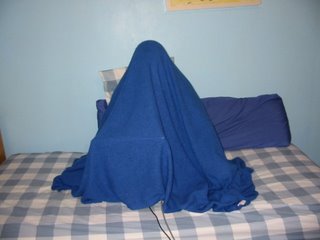Another Day, Another Genre
I rented Chan-wook Park's movie Oldboy last night because I'm still hunting around for "my" genre, and for some strange reason, I thought that Korean sadomasochism films (or just plain Korean films, since they're pretty much all about sadomasochism) might be it. Don't read too much into that.
I should probably clarify. Apparently, sadomasochism has been running through Korean storytelling for generations. In my Asian humanities class, we read something from the nineteenth century called The Memoirs of Lady Hyegyong, about this king who's imprisoned in a box for like thirty years, goes mad (naturally), and kills a bunch of people when he gets out. Fun, fun stuff. Cut to a hundred and thiry years later, when people like Quentin Tarantino and David Fincher have perfected the art of stylized violence, and Korean cinema is basically high-concept excuses for chopping people up in various ways. Tarantino, in fact, awarded the Grand Jury Prize at Cannes to Oldboy, no doubt comparing it to his own misguided revenge drama in theaters at the time.
Oldboy is higher-concept than Kill Bill, with less of an excuse and less need to copy Peckinpah and those crazy seventies Hong Kong films. Park actually starts off with an original idea: a businessman, played by some Korean guy you've never heard of before, is kidnapped and held in a mysterious apartment. Fifteen years later, he wakes up on a grassy rooftop with a change of clothes, a cell phone, and a wallet full of cash. Then he eats an octopus. A live octopus. Ewwww. Anyway, who kidnapped him? Why? Why was he released? These are questions you ask while reading the copy of the back of the DVD case.
Too bad I stopped caring like fifteen minutes into the movie. There's something about the revenge drama genre that demands mindless, one-dimensional characterizations incapable of truly appreciating their vengeance. I can think of examples dating back to Titus Andronicus — revenge isn't merely cooking up the boys who raped your daughter and feeding them to their mother, revenge is a reversal of fortune: the haughty are brought low as the humble exalts himself. Otherwise, the whole deal is empty and you wind up with these hackneyed speeches about how killing so-and-so won't bring your partner back, which would've fit nicely in about ten different places in Oldboy. Maybe in place of that moronic sequence showing how our protagonist was hypnotized. (And no, I didn't ruin anything for you. Park ruined it by throwing in the hypnosis thing.)
However, since Park mistook style for genuine characterization, Oldboy rings very loud, and very hollow. Part of it is Park being completely oblivious to the fact that his antagonist is a total bastard, but Oldboy's bigger problem seems endemic to the whole Korean New Wave. Park is manipulative, from recurring themes mixing metaphors (the opening scene, with some random character almost falling off a roof, gets seen again, in the lamest of lame contexts, at the end), to the protagonist prying out this dude's teeth with a hammer, to the thing with the octopus, to the electronica operatic score, all of which are vacuous with a facade of resonance. "He's got a knife in his back but he's still fighting. Wow, he must really be pissed!" Well, yes, we get that. But maybe we can take a slightly less dispassionate look at our characters: yes, he's angry, but he's probably also confused and relieved to be free and a bunch of other things that Park never bothered to think of. Maybe Justin Lin will do better with the American remake. Ha!

0 comments:
Post a Comment